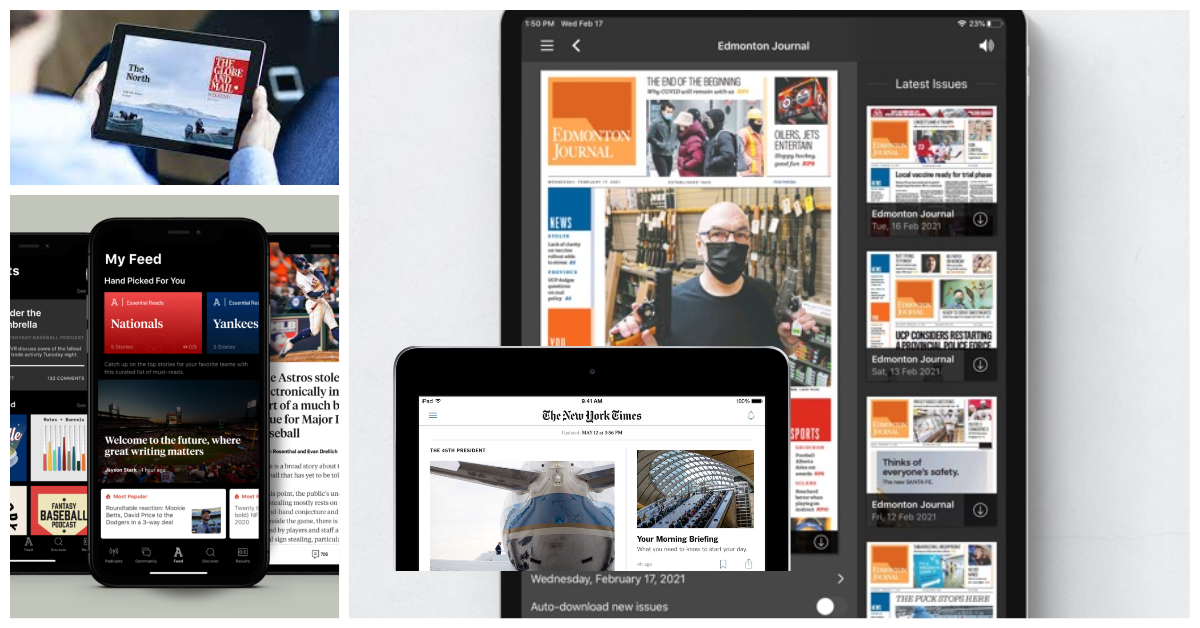Death of the Printing Press
It didn't get much notice last week when the Vancouver Province and Vancouver Sun newspapers announced they were closing their office and reporters would keep working from home. It was another brick in the wall of print journalism falling down.
While the strength of daily papers isn't what it used to be, a quick look around will show we have lots of options for good journalism - far more than ever.
It's All Digital Baby
If you read this blog, you know what a newspaper junkie I am. Growing up in Edmonton, I started reading the Journal every day before I became a teenager.
A few years ago, growing disillusioned with the lack of content in the Journal compared to the past, I decided to stop my print subscription and moved over to digital. It was about 25% of the price for the printed version. I wrote a blog about the move when I made it.
I thought it would be a difficult adjustment, but it wasn’t. In fact, I’d never go back now. Reading it every morning on my iPad while having breakfast is a far better way of doing it. There’s no paper to spread out, no mess and no paper to recycle.
Recently, I decided to add digital subscriptions to the Globe and Mail, New York Times and The Athletic, which came free with the NY Times subscription.
It’s more than I need and I likely won’t renew all of them, but I was finding that I was whipping through the Edmonton Journal so quickly, I wasn’t even finished my first cup of coffee.
The Death of Print
The new digital subscriptions are great. I have more than I need to read, but it’s wonderful to have options.
It made me think about the future of “print journalism” and I can see newspapers making it if they move to digital and it’s accepted as well by others as it has been by me. I shouldn’t use the word “if” they move to digital only because there’s little doubt in my mind they’ll have to.
I expect in the next few years most major daily newspapers will only be available in digital. The trick will be whether enough people will make the move to digital to allow advertisers to follow them. That’s the biggest question right now, not whether they’ll make the full move.
I do expect in the future printing presses will be in museums. Kids will wander through and be told about how their parents and grandparents used to read news stories off large printed sheets that rolled off the presses. They’ll learn how the papers were folded and stacked on top of each other. To top it off, they’ll be told how these papers were then taken to a central location where people picked them up and proceeded to drop them off in people’s mailboxes and on their front steps around 4:00am.
The class of 2050 will think we’re crazy.
The Vital Niche Market
It can easily be argued it’s more important than ever for newspapers, in any form, to continue to exist.
In the last few years the mistrust in the media, combined with right-wing governments ignoring the basic truth, has made good reporting absolutely critical.
I’m not about to defend Postmedia for being unbiased, but when it comes to daily papers, it’s the biggest game in town. With the exception of The Star, we don’t get much local news in printed form anywhere else on a daily basis.
Weekly newspapers do a wonderful job of informing their local communities of what’s happening, but the vast majority of people live in the big cities in Canada, “served” by the dailies.
There are exceptions though. What has happened to newspapers and the news media in general has opened the door for other smaller niche publications to exist, and in some cases thrive.
They’re also in digital form and are subscription-based. As big media continues to erode, they play a vital role in not only filling the gap that exists for news, but also providing a different slant than what the mainstream media offers.
One such example is Blacklock’s Reporter, an excellent subscription service owned and operated by former Edmonton journalists Holly Doan and Tim Korski.
It is the little publication that could and it constantly breaks as many stories about the federal government, if not more, than the big guys.
It’s interesting to see the federal government, through Bill C-18, working to make big web companies like Google and Facebook pay Canadian media outlets for using their work, while still refusing to settle a lawsuit brought by Blacklock’s ten years ago. Just a couple of weeks ago in the Senate, Senator Leo Housakos brought this up and pointed to the federal government sharing a Blacklock’s subscription with dozens of federal employees. He called it “stealing” and he’s right. It will be a landmark case, if we ever get a judgement.
Let’s hope those who produce the content get a fair payment for it, whoever it comes from. If they don’t, it won’t just be the printing press we find in museums, it may be democracy too.
Thanks Grant. I enjoy the articles you post through LinkedIn.
Doug King
Thanks Doug. Much appreciated.
-Grant


Commentary